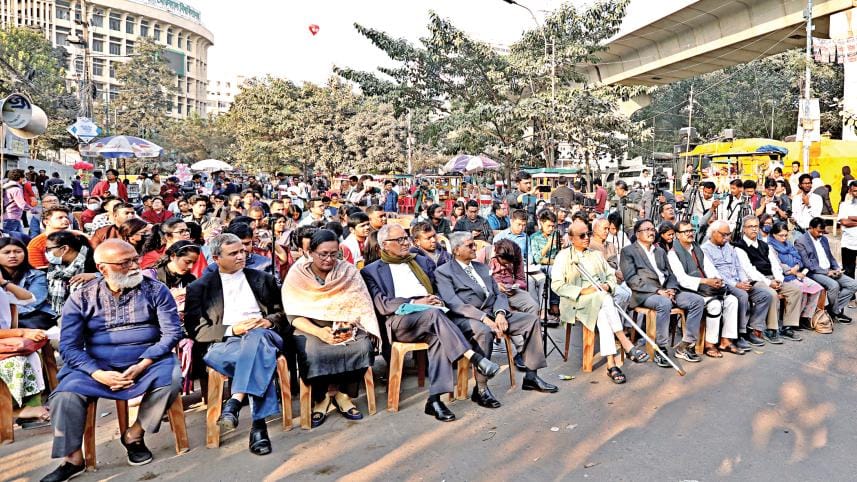Conduct impartial probe, arrest culprits

There should be an impartial investigation into recent attacks on indigenous communities and the perpetrators must be arrested immediately, said rights activists, political leaders, and journalists yesterday.
At a demonstration organised by the Aggrieved Civil Society in front of the National Museum at Shahbagh, speakers also called for the reinstatement of removed graffiti in textbooks and the inclusion of content highlighting the history, heritage, and cultures of indigenous communities.
Their other demands included ensuring treatment for injured indigenous students and citizens, investigating groups supporting the attackers, and holding them accountable.
The demonstrators further urged the National Curriculum and Textbook Board to apologise for removing the term "indigenous" from textbooks and demanded an explanation from the government regarding law enforcement's inaction during the premeditated attacks.
Bangladesh belongs to many ethnicities, religions, and languages. Granting constitutional recognition and ensuring the rights of these communities is the essence of pluralism
Dhaka University Professor Robayet Ferdous, who chaired the event, emphasised the importance of pluralism, saying, "Bangladesh is not just for Bangalees or Muslims. It belongs to many ethnicities, religions, and languages. Granting constitutional recognition and ensuring the rights of these communities is the essence of pluralism."
He added, "Minorities have been attacked in many ways. Among them, many were politically motivated, but the fear experienced by the remaining thousands of minorities in the country is unbearable. We cannot progress with this fear."
While the head of government presents the graffiti to the world, the NCTB removes it. What message is the government trying to send?
Gajendranath Mahato, joint general secretary of Bangladesh Indigenous Forum, questioned the government's role, saying, "The government, which was formed following a movement against discrimination, now seems to be creating even greater discrimination."
He criticised the lack of accountability, pointing out that perpetrators filmed during the recent attacks remain free.
Alik Mri, an organiser of Aggrieved Indigenous Students and Masses, accused the government of attempting to silence indigenous voices through violence. "The state is intentionally attacking us. They are creating a situation where indigenous people are neither acknowledged nor allowed to stay in this country."
Karim Sikdar, joint general secretary of Bangladesh JASAD, said, "While the head of government presents the graffiti to the world, the NCTB removes it. What message is the government trying to send?"
He said the recent attacks were tightening the grip of discrimination in the country.
Shamsul Huda, executive director of ALRD, pointed out that the constitution does not prohibit the use of the term "indigenous" and called for a directive to ensure its respectful use across state systems.
Professor Jobaida Nasreen of Dhaka University's Anthropology Department demanded an investigation into the organisations influencing the decision-making of the government.
"We need to investigate who these organisations are, what their intentions are, and why the government made changes based on a single demand [to remove graffiti with the word adivasi] from them."
She warned against empowering such groups and called for the restoration of the graffiti within three days.
Professor Khairul Islam of DU's Sociology Department suggested forming a commission to address indigenous issues and prevent future attacks.
Shaheen Anam, executive director of Manusher Jonno Foundation, strongly condemned the attacks, saying, "There are no words strong enough to protest this. The same graffiti we proudly display globally is being targeted and attacked here -- this is utterly unacceptable."
She criticised the lack of dialogue and transparency behind such decisions affecting marginalised communities. "Simply saying we are all Bangladeshis is not enough. Minorities live in constant fear, and that is a shame for us as a nation. Why should anyone live in fear in their own country?"
Shaheen Anam also highlighted the government's failure to restore trust among minority communities and its broader inaction on women's rights and ongoing oppression. "An incident occurs, we protest, and then go silent. Is this the new Bangladesh?" she asked.
Ruhin Hossain Prince, general secretary of the Communist Party of Bangladesh, condemned the removal of graffiti, calling it an insult to the July uprising.
"The graffiti was removed based on the demands of a few individuals. What kind of decision is that? We do not want to witness any incident based on mob mentality," he said.



 For all latest news, follow The Daily Star's Google News channel.
For all latest news, follow The Daily Star's Google News channel.
Comments